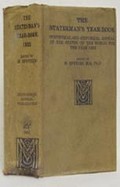Abstract
Cuba, except for a brief period of British occupancy in 1762–63, remained a Spanish possession from the date of its discovery by Columbus until December 10, 1898, when the sovereignty was relinquished under the terms of the Treaty of Paris which ended the armed intervention of the United States in the struggle of the Cubans against Spanish rule. Cuba thus became an independent State. A convention which assembled on November 5, 1900, drew up a constitution which was adopted February 21, 1901, under which the Island assumed a republican form of government, with a President, Vice-President, a Senate and a House of Representatives. A law was passed in Washington authorising the President of the United States to hand over the government to the Cuban people upon the undertaking that they should conclude no treaty with a foreign power that would endanger the independence of Cuba, that no debts should be contracted for which the current revenue would not suffice, that the United States should hare certain rights of intervention, and be granted the use of Naval Stations. On June 12, 1901, these conditions were accepted. On February 24, 1902, the election of the President and Vice-President took place, and the control of the Island was formally transferred to the national government on May 20. The coaling station of Guantanamo Bay was leased to the United States for 2,000 dollars annually, on July 2, 1903.
Access this chapter
Tax calculation will be finalised at checkout
Purchases are for personal use only
Preview
Unable to display preview. Download preview PDF.
Books of Reference concerning Cuba 1. Official Publications
Annuario Estadistico de la Republica de Cuba. Havana. Annual. (First issue, 1914.)
Cuba : What She has to Offer to the Investor or the Home-seeker. Havana, 1915.
Report of the Committee on Foreign Relations on Affairs in Cuba. United States Senate, No. 885. Fifty-fifth Congress. Washington.
Monthly Bulletin of the Bureau of the American Republics for September, 1905. Washington.
Estadística General: Comercio Exterior. Quarterly and Annual.—Movimiento de Poblacion. Monthly and Annual. Havana.
Informe Bi-Anual Sanitario y Demográfico. Havana.
2. Non-Official Publications
Cuba Review. Monthly. New York.
Guía-directorio de la república de Cuba. (Bailly-Baillière-Riera.) Comercio, industrial, agricultura, ganadería, minería, propiedad, profesiones y elemento oficial. Barcelona, 1922.
Atkins (J. B.), The War in Cuba. London, 1899.
Caldwell (R. G,), The Lopez Expeditions to Cuba, 1848–1851. London and Princeton. 1915.
Callahan (J. M.), Cuba and International Relations. London, 1902.
Camps (G.), Isla de Pinos. Santa Fé, Isle of Pines, 1927.
Chapman (C. E.), A History of the Oubau Republic : A Study in Hispanic American Politics. New York and London, 1927.
Davey (R. ), Cuba in War Time. London, 1897.—Cuba Past and Present. London, 1898.
Ewart (F. C.), Cuba y las costumbres Cubanas. Boston, 1919.
Fiske (A. K.), History of the Islands of the West Indian Archipelago. New York, 1899.
Guiteras (P. I.), Historia de Cuba. 2 vols. New York, 1865–66.
Johnson (W. F.), History of Cuba. 5 vols. New York, 1920.
Key (H.), Eatfee, Zucker und Bananen. A Journey to Cuba and Guatemala. Munich, 1929.
Leslie’s Official History of the Spanish-American War. Washington, 1899.
Lindsay (F.), and Winters (N. O.), Cuba and Her People of To-day. Revised. Boston, 1928.
Musgrave (G. C), Cuba : The Land of Opportunity. London, 1919.
Parker (W. B.), Cubans of To-Day. New York, 1919.
Piron (H.), L’Ile de Cuba. Paris, 1898.
Porter (R. P.), Industrial Cuba. New York, 1899.
Robinson (A. G.), Cuba : Old and New. London, 1916.
Roosevelt (Th.) The Rough Riders. London and New York, 1899.
Terry (Philip), Terry’s Guide to Cuba. New York, 1926.
Torriente (C. de la), Cuba y los Estados Unidos. Introduction by James Brown Scott. Havana, 1929.
Trelles (C. M.), Biblioteca geográfica Cubana. Matanzas, 1920.
Valdis Roig (L.), El Comercio Exterior de Cuba. Havana, 1920.
Wright (I. Α.), The Early History of Cuba (1492–1586). London, 1917.
Editor information
Copyright information
© 1932 Palgrave Macmillan, a division of Macmillan Publishers Limited
About this chapter
Cite this chapter
Epstein, M. (1932). Cuba. In: Epstein, M. (eds) The Statesman’s Year-Book. The Statesman’s Yearbook. Palgrave Macmillan, London. https://doi.org/10.1057/9780230270619_21
Download citation
DOI: https://doi.org/10.1057/9780230270619_21
Publisher Name: Palgrave Macmillan, London
Online ISBN: 978-0-230-27061-9
eBook Packages: Palgrave Political & Intern. Studies CollectionPolitical Science and International Studies (R0)

